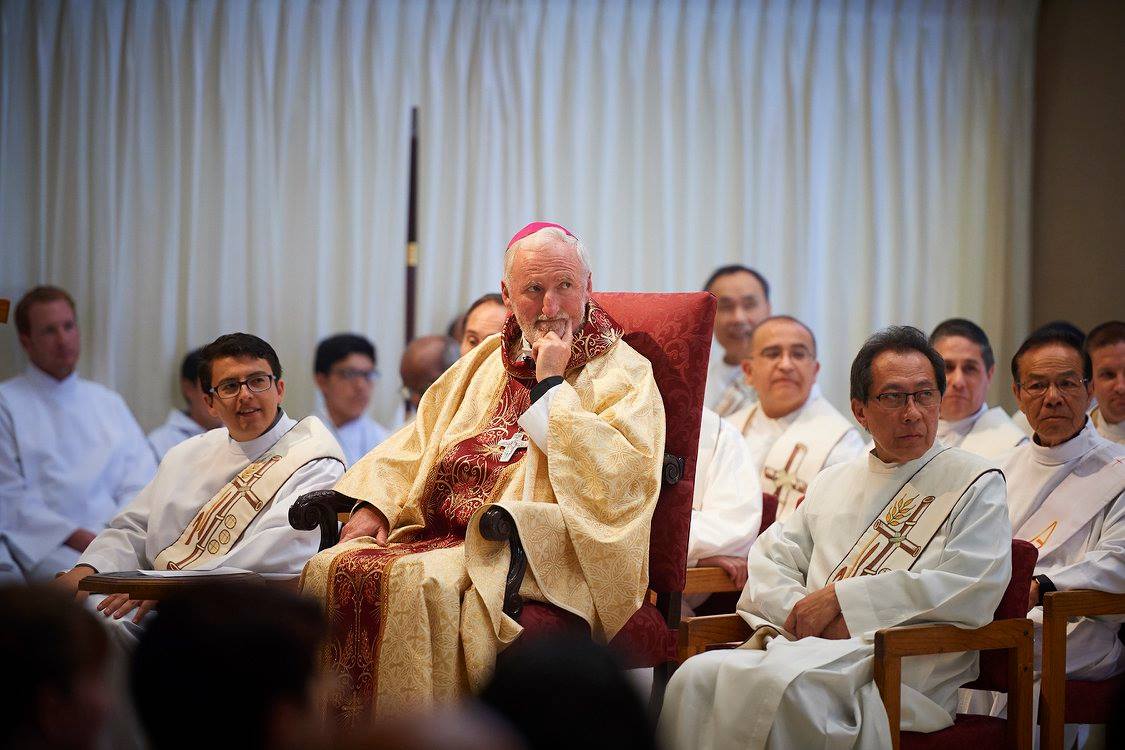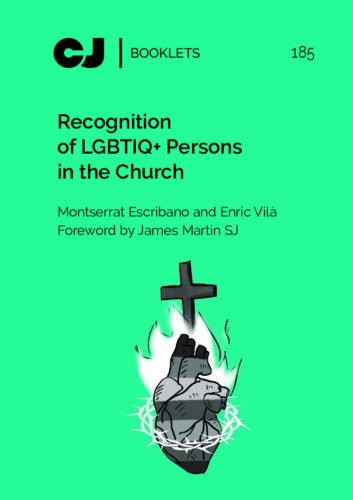Bill Chapman is gay Catholic man who lives in the Los Angeles area. He has helped lead LGBTQ ministry in the archdiocese since 2011, working with several parishes to implement and foster outreach to LGBTQ Catholics and their families through the Catholic Ministry with Lesbian and Gay Persons.
In 2015, through a leadership role on an archdiocesan council, Mr. Chapman met Bishop David G. O’Connell, who in February was killed by a gunman. Earlier this month, the suspect arrested for the bishop’s murder, Carlos Medina, pleaded not guilty. Mr. Medina, the husband of the bishop’s former housekeeper, is a handyman who worked occasionally at the bishop’s residence.
Thousands attended Bishop O’Connell’s funeral at the Cathedral of Our Lady of the Angels on Mar. 3, where Archbishop Jose Gomez of Los Angeles read a telegram from Pope Francis. The pope recounted Bishop O’Connell’s “profound concern for the poor, immigrants and those in need, his efforts to uphold the sanctity and dignity of God’s gift of life and his zeal for fostering solidarity, cooperation and peace within the local community.”
While few stories have circulated about Bishop O’Connell’s interaction with the LGBTQ Catholic community, Mr. Chapman said his initial encounter with O’Connell was relatively brief—but life changing. Mr. Chapman recounts that experience below, as told to America’s national correspondent, Michael J. O’Loughlin. It has been edited for length and clarity.
O’Loughlin: How did you meet Bishop O’Connell?
Chapman: The L.A. archdiocese is the largest in the nation. It’s broken up into five regions and there are five regional bishops. At the time, I was out at Holy Family in South Pasadena. I had been nominated to be part of the Regional Pastoral Council for the San Gabriel Region.
When I first got on to the council, I was concerned about the sexuality issue. But I had heard that the bishop who was then-assigned to the council was very open to LGBT people. So I thought, okay, I’ll be fine. And then, like that, he’s gone. We had an interim for two years. Then I was elected as moderator of the council. And that was when Bishop Dave was assigned to the region.
The look on his face, in his eyes, was just this response with such depth and warmth. He immediately put me at ease.
We had emailed back and forth a couple of times, to say hello, and he seemed like a nice guy. But first time I met him was at his first meeting with the council. He asked us to do a faith-sharing exercise. It was a pretty deep experience.
I said to myself afterward, “Bill, this guy is going to be totally open to whoever you are, and you should talk to him.”
So after the meeting, I went up to him and we started having a conversation. I just said, “Bishop, I hope you don’t mind, but I really feel very comfortable with you. And I’d just like to share my story with you.”
I told him that I am a gay man and that I had been with the church, volunteering, for a long time.
The look on his face, in his eyes, was just this response with such depth and warmth. He immediately put me at ease. The very first thing he said to me was, “Thank you for staying. Thank you for not leaving. We need you. We really need you.”
I shared more of my experience. He’s listening and I’m crying. It was so beautiful and warm and such a Christ-like response. It did more for my own personal feelings of acceptance, for my place in the church, than anything else.
I had heard similar messages from other priests, but I still hadn’t believed it. I thought: Well, okay, but what if they’re wrong? But Bishop Dave’s response came from such a place of gratitude, for me and who I am.
For those who didn’t know the bishop, what was he like?
Bishop Dave was seriously funny. He was constantly throwing out one-liners, so I started to get a different impression of Jesus through him. Here was this white guy from Ireland, who, for 40 years, had been in South Central Los Angeles. He was in parishes that were mostly African American, Hispanic and everybody loved him.
Bishop Dave brought me to a place where I never thought I could go. It gave me so much freedom.
He was totally welcomed because he walked the walk and talked the talk and he lived out the existence of all the people he ministered to. He knew where people were on their journeys, what was going on in their lives. He just made everyone feel like they were so special, just a perfect child of God.
What was your experience like in the church prior to meeting the bishop? Had you reconciled your faith and sexual orientation?
Internally, I still hadn’t felt fully accepted before I met Bishop Dave. In my parishes, at Holy Family and at St. Monica, I was accepted. But I was hearing so many mixed messages from bishops, even from our own archbishop. Sort of a tacit acceptance: as long as you’re living your life a certain way, you’re doing okay. But if you stray from that, you’re not really accepted, you’re sinning and you probably wouldn’t be eligible for employment in the archdiocese.
I came out in my late 20s, in the early 1990s, when there was very little acceptance in society. And definitely none in the church. I think that just stayed with me, was a part of me. Some days, still, it’s like, wait, am I okay?
Once I had started feeling acceptance in the church, I got very busy, with all sorts of committees and councils and leading fundraisers. I thought, well if I’m busy, if I’m working hard, they’ll like me and I’ll be accepted.
But Bishop Dave brought me to a place where I never thought I could go. It gave me so much freedom. He planted in my mind the idea that I don’t have to always be producing and doing all this work. I don’t have to be a Martha all the time in order to be accepted in the church. That I’m fine just by virtue of who I am.
In light of that, what was it specifically about your interaction with the bishop that was meaningful?
I had endured some horrible experiences in the confessional. I was told that I was disordered and that there was very little hope for me. The parish I grew up in was very conservative, sort of anti-everybody. But it was clear there was no room in the church for LGBT people.
So I chose my parishes very carefully. If I heard an anti-LGBT message, I knew I wouldn’t be coming back to that parish. I won’t subject myself to hearing that I am not good.
He looked me right in the eyes and let me know I was fine.
But Bishop Dave’s first words were gratitude to me for staying and wanting to be part of the church. He talked about how many LGBT people had left. He understood why they left and he didn’t necessarily blame them for leaving. He was grateful that I had stayed. He looked me right in the eyes, with those bright blue Irish eyes, and let me know I was fine. Even as I was crying, he put his hand on my shoulder, very pastorally. I could feel warmth and comfort. And I felt safe. I really did. I felt safe. And that was it.
What was your reaction when you learned the bishop had died?
When I first heard about his death, I felt disbelief. My friend texted me and said, “Bishop Dave died in his sleep.” I thought, he wasn’t that old? And he was very healthy. We’d bring donuts to meetings and he’d never have one. Just a very healthy guy. I thought, that didn’t make sense that he would have died in his sleep.
I went online and did all these Google searches, when something came up about the shooting. And that’s when I thought, oh no. I was in total disbelief. It was like one of the biggest kicks in the gut I’ve ever felt in my life. Disbelief and pain. I was crying thinking about what had happened to this good man. And I wanted to know more.
What do you want people to know about Bishop O’Connell?
The senselessness of his murder still runs through my mind. But I also think about the outpouring of love that we saw following his death. Maybe if he had died of a heart attack, in his sleep, maybe the same focus wouldn’t have been on him and his ministry? I don’t want to sound morbid, but that’s the only consolation I can find. Maybe because he died so tragically, people will pay more attention to his life, who he was, and what he did.
And maybe people will recognize that this man was, I believe, a saint walking among us.




